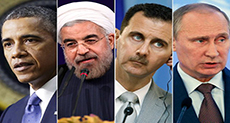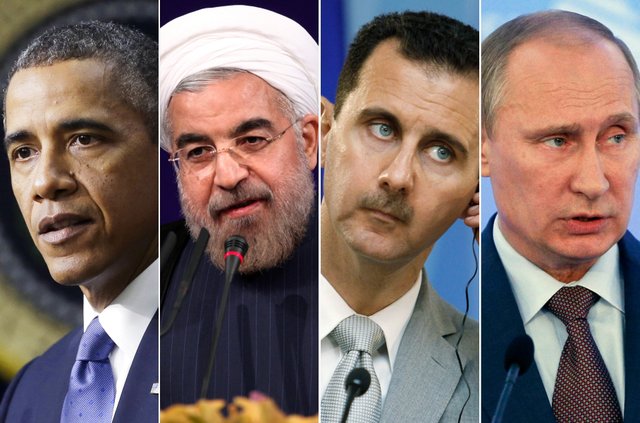
A Regional Order Safeguarding the Constitutional National State

Nasser Qandil
The-American-Russian-Iranian talks that have taken place a year ago led to a strategic conclusion that delineates a unified vision of the region. Through this conclusion, the resolution of the intractable conflicts that have been going on for years is expected between the American, Russian, and Iranian parties.

This conclusion has been the basis for reaching an understanding on the nuclear dossier; and by extension, the Ukrainian crisis and the Libyan and Yemeni issues. It has also been the basis for finding an approach that attenuates the disagreement among the three states while conforming to their views on the Syrian crisis.
"Meddling with the borders of Middle Eastern countries and weakening the power and centrality of the state therein is instigated by international and regional powers, under the pretext of seeking a better regime based on democracy and human rights, or seeking political gains in the relations with these countries, or changing the political geography and alliances in the region, runs the risk of giving "al-Qaeda" and its offshoots, namely "ISIL", the golden opportunity to break down borders and build a transnational entity comprising Syria, Iraq, Jordan, Egypt, Libya, Saudi Arabia, and Turkey, turning this entity into the primary beneficiary of the crisis, which could become an indestructible power.
In other words, the elimination of the threat of "al-Qaeda" and its offshoots, namely "ISIL", is inconceivable without strengthening and enforcing the status of unitary states in the region, allowing them to control their own borders, and encouraging the components therein to partake in compromises that would ultimately achieve this goal."
This is the gist of the conclusion written by a Russian diplomat, resulting from the negotiations that have taken place between Moscow, Washington, and Tehran during the summer and fall of the past year. The conclusion led to getting the green light to extend the negotiations on the Iranian nuclear dossier in Vienna beyond its November deadline. It includes an Iranian-Russian commitment to abstain from meddling with the unity of Egypt, Saudi Arabia, and the rest of the Gulf States, and to ensure the cohesion of these unitary states regardless of the inclinations of their respective political leaderships.
In exchange, the United States will commit to systematically abolish its open warfare against political leaderships in Syria, Iraq, and Yemen, after they had been menaced by wars that threatened the notion of the state and its borders. On the practical level, this means that Russia and Iran will seek to suggest political initiatives that their allies in Syria, Iraq, and Yemen would accept, thereby accommodating the players of the opposite camp.
In parallel, the United States will commit to push for the repositioning of its Turkish and Saudi allies in light of unambitious, middle ground compromises. In other words, these compromises are marketable, able to limit warfare to war against terror, thereby distinguishing between adopting and supporting certain Yemeni and Syrian parties, on the one hand, and falling into the trap of betting on terrorism and extremism on the other. The latter would yield naught but the destruction of the idea of the state by way of political trickery, hatred, rancor, small-mindedness, or trifle gains.
The nuclear agreement with Iran came as an American green light to start of the implementation of this strategic conclusion. However, amid the general agreement on the goals and means, the bone of contention concerns the way of successfully combining the war on terror on one hand and the notion of the state on the other.
The disagreement about the means of achieving this goal is still strong, especially in Syria and Yemen. In these two countries, the discussion no longer surrounds the Syrian President Bashar al-Assad or the Houthi Movement. Rather, it is unanimously agreed that a strong and unified state in Syria is impossible without a strong military.
It is equally unanimous that victory over terrorism is impossible without a strong Syrian military and that no such military exists in Syria without al-Assad. Also unanimous is that the unity of Yemen, the existence of a strong Yemini state, and the chances of weakening "al-Qaeda" are impossible without a central role for the Houthis in building this state and embracing its military.
The disagreement is on the role of the state in Syria and Yemen that would lead to assimilating the components and forces supported by Saudi Arabia and Turkey, many of which are intertwined with "al-Qaeda" and its offshoots. This disagreement stems out of the experience with "al-Nusra Front", which ended in accepting that it is the official offshoot of "al-Qaeda", and recently with "Ahrar al-Sham", which eulogized Mullah Omar as a teacher, chieftain, sage, and leader.
The disagreement is thus over the identity and number of the forces qualifying as distant from extremism and terrorist organizations and the means of making agreeable to al-Assad and the Houthis the political compromises that exclude extremists and "al-Qaeda" affiliates, with the risk of their being mere façades that will fall before the first elections, no matter how honest. This offers these façades an importance that is ill-suited for both their actual size within society and their alleged role in the war on terror.
This is what the Russian-Iranian-American communications seek to settle by engaging in dialogue with Saudi Arabia, Syria, Turkey, and the Houthis. In that vein, Iran has presented its initiative on Syria, the essence of which is holding transparent parliamentary elections under international supervision and according to international standards. These elections will serve as a conclusive referendum regarding the issues of presidency and the upcoming government. The Iranian initiative especially stresses cancelling all aggressive measures, sanctions, and boycotts against Syria.
Before the dangers of crossing Sykes-Picot being available to "ISIL" alone, and the re-division of the borders that the agreement had originally created, these borders, set by the by the French and British colonists, have become a construct that must be tenaciously maintained in order to safeguard the notion of the constitutional national state. On the other hand, the resistance front's counter-crossing of these borders is but a defensive reaction that will culminate in confronting "Israel" and making uncertain its future, rather than eliminating the borders of other entities.
Source: Al-Binaa Newspaper, Translated and Edited by website team
Comments



